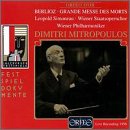| All Artists: Hector Berlioz, Dimitri Mitropoulos, Vienna Philharmonic Orchestra, Léopold Simoneau Title: Berlioz: Grande Messe des Morts Members Wishing: 0 Total Copies: 0 Label: Orfeo D'or Release Date: 9/16/2000 Genre: Classical Styles: Opera & Classical Vocal, Chamber Music, Historical Periods, Classical (c.1770-1830), Early Music, Modern, 20th, & 21st Century Number of Discs: 1 SwapaCD Credits: 1 UPC: 789368604722 |
Search - Hector Berlioz, Dimitri Mitropoulos, Vienna Philharmonic Orchestra :: Berlioz: Grande Messe des Morts
 | Hector Berlioz, Dimitri Mitropoulos, Vienna Philharmonic Orchestra Berlioz: Grande Messe des Morts Genre: Classical
The Requiem is just the sort of big, dramatic work that Dimitri Mitropoulos excelled in, and sparks fly in this live 1956 performance from the Salzburg Festival. The mono sound is contricted, though--the last thing you'd... more » |
Larger Image |
CD Details
Synopsis
Amazon.com
The Requiem is just the sort of big, dramatic work that Dimitri Mitropoulos excelled in, and sparks fly in this live 1956 performance from the Salzburg Festival. The mono sound is contricted, though--the last thing you'd want in a piece that even stereo can barely contain. But if you make the required mental adjustment, it's a ride worth taking. Leopold Simoneau is peerless in his solo turn, though his mellifluous tenor is heard in better sound on Charles Munch's RCA stereo recording made a few years later. But this well-filled disc (seconds shy of 80 minutes) is a valuable historical supplement. --Dan Davis
Similar CDs
| SWEET SOUL MUSIC REVUE Live At Capitol Genres: Pop, R&B, Rock Label: zyx/ayia | |

 Track Listings (11) - Disc #1
Track Listings (11) - Disc #1
